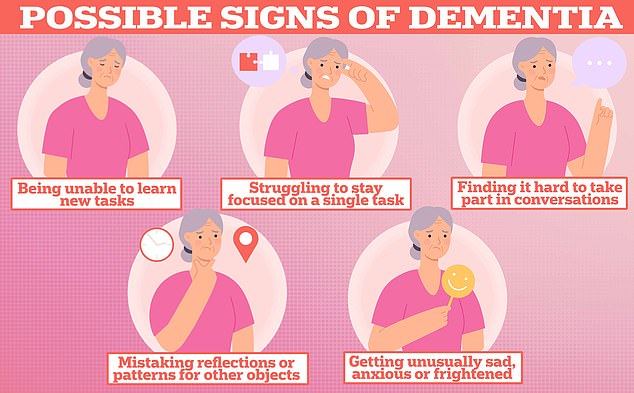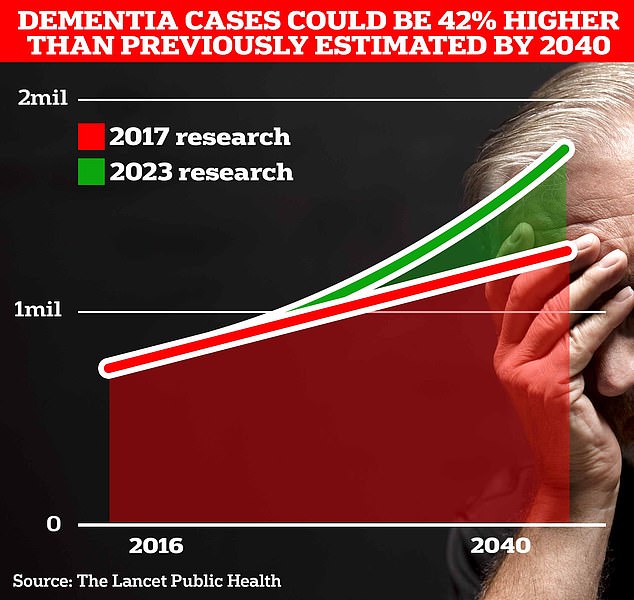Research identifies intriguing personality factors that increase dementia risk. Do you have one of them?
Scientists claim to have identified the key factors that put people at higher risk of developing dementia – and some of them could lie in our personalities.
US researchers analyzed more than 20,000 adults over the age of 50 to estimate their risk of developing the memory-robbing disorder.
Including unavoidable factors such as the onset of older people’s genetic makeup, experts said there were twelve key variables that influenced risk.
Suffering from a stroke, poor physical health, diabetes or a BMI over 35 – classified as obese – were among the symptoms. Studies have long suggested that this is the case.
But three, all linked to personality, were also identified by economists at California-based think tank RAND.
These included not being career-oriented (‘never having worked or having only worked for a few years’), being less conscientious and having little involvement in hobbies.
Other risks included rarely drinking alcohol or drinking excessively, never exercising, scoring low on physical tests, having lower cognitive skills, or having functional limitations – being limited in fully performing daily activities.
However, they cautioned that their findings only showed a link between the factors and dementia. They did not cause the condition.
US researchers analyzed more than 20,000 adults over 50 to estimate the risk of memory loss

Not being able to learn new tasks and struggling to stay focused on a single task could be a sign of dementia – the memory-robbing disorder that affects almost 1 million Britons and seven million Americans
In the report, they wrote: ‘Older people who aim to maintain high cognitive function for a longer period of time could benefit from early changes in their lifestyle, such as engaging in exercise, working extra years, pursuing hobbies and new information activities after retirement, and maintaining good physical health.’
However, they added: ‘The estimated effects of the psychosocial measures vary widely across the models assessed, and we did not see a clear pattern.
‘For example, practicing hobbies and new information activities protects against the incidence of dementia in two years, but not in four years.
‘Having a conscientious personality is estimated to protect against the incidence of dementia over four years, but not over two years.
‘Therefore, these results are somewhat sensitive.’
But they hope that through By raising awareness of risk factors – which change as we age – people can take steps to reduce their chances of developing the disease.
It comes as a landmark study from July suggested that almost half of all cases of Alzheimer’s could be prevented by tackling fourteen lifestyle factors from childhood.
The world’s leading experts found that two new risk factors – high cholesterol and vision loss – together accounted for almost one in 10 cases of dementia worldwide.

Around 900,000 Britons are currently thought to suffer from memory theft disorder. But scientists at University College London estimate that this number will rise to 1.7 million within 20 years as people live longer. It represents an increase of 40 percent compared to the previous forecast in 2017
They join twelve existing factors, ranging from genetics to smoking status, that experts have found increase the risk of someone suffering from dementia.
If we ignore unavoidable factors such as the onset of the genetic makeup of older people, experts said that smoking and lack of exercise play a roleexcessive alcohol consumption, social isolation and air pollution were responsible for four in ten cases of the condition.
Experts claimed the study, published in the prestigious journal The Lancet, offered more hope than ‘ever before’ that the memory-robbing disorder devastating the lives of millions of people could be tackled.
Recent analysis by the Alzheimer’s Society estimates that the total annual cost of dementia to Britain is £42 billion per year, with families bearing the brunt.
An aging population means these costs – including the lost income of unpaid caregivers – are expected to rise to £90 billion over the next fifteen years.
Alzheimer’s disease is the most common form of dementia, affecting 982,000 people in Britain.
It is thought to be caused by a buildup of amyloid and tau in the brain, which clump together, and by plaques and tangles that make it harder for the brain to work properly.
Eventually, the brain struggles to cope with this damage and dementia symptoms develop.
Memory problems, thinking and reasoning problems, and language problems are common early symptoms of the condition, which then worsen over time.
The analysis by Alzheimer’s Research UK found that 74,261 people died from dementia in 2022, up from 69,178 a year earlier, making it the country’s biggest killer.

